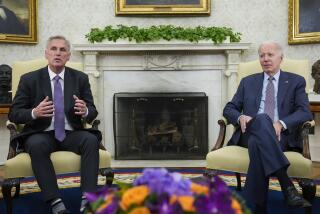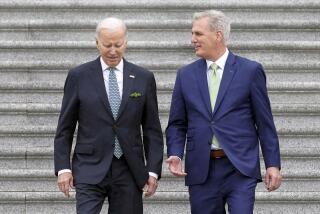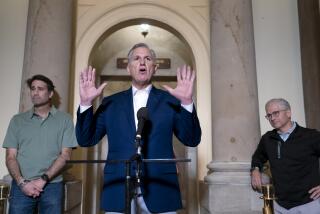‘We have a deal’: Biden, lawmakers reach tentative bipartisan infrastructure agreement

The $1-trillion infrastructure deal, if successfully enacted, would mark the first major bipartisan legislative accomplishment for Biden.
- Share via
WASHINGTON — President Biden and a bipartisan group of senators agreed on a nearly $1-trillion infrastructure plan Thursday, the culmination of months of negotiation over a proposal to fortify the nation’s roads, bridges and broadband internet access.
“We have a deal,” Biden said, standing with the 10 senators in the West Wing driveway after their 30-minute Oval Office meeting. “They’ve given me their word,” he said of the group, five senators from each party’s caucus. “Where I come from that’s good enough for me.”
It’s a big step forward, and validation for the Senate negotiators and a president determined to show that working across the political aisle is still possible in such a partisan era. But, given the deep divide in Washington and Democrats’ thin congressional majorities, securing the votes to pass a bipartisan package won’t be easy.
The meeting came after the group of senators reached a tentative agreement with White House aides Wednesday evening following two days of meetings on Capitol Hill.
“We made serious compromises on both ends,” Biden said, acknowledging that Republicans weren’t going to back the investments in “human infrastructure” he’s called for.
He said he would push those in a separate package that would require support from every Democratic senator. “We’ll see what happens in the reconciliation bill and the budget process,” he said.
The plan calls for nearly $600 billion in new spending, with the rest of the funds coming from existing pots of money.
The deal, if enacted, would mark the first major bipartisan legislative accomplishment for Biden, who campaigned on his ability to work across the aisle with Republicans.
This agreement would cover only a fraction of what Biden originally called for in his $4-trillion proposal to invest in “hard” infrastructure of roads and bridges, alongside “human” infrastructure, such as child care and elder care programs.
The plan calls for $109 billion for road and bridge projects, $7.5 billion to build a new network of electric vehicle-charging stations, $55 billion to replace all lead pipes and upgrade water infrastructure and $66 billion in rail line expansion.
Calling the investments “long overdue,” Biden framed the breakthrough as a strong signal to the rest of the world that in the global economic competition with autocracies such as China, “democracies can deliver.”
“This agreement signals to the world that we can function, deliver and do significant things,” he said.
But in an aside at the outset of his remarks, Biden acknowledged the tenuous nature of the agreement and its legislative prospects, ad-libbing that the negotiations were settled only “for the moment.”
On Capitol Hill, senators who were not involved in the negotiations were reluctant to commit to supporting the plan without seeing full details. But in a positive sign, neither progressives nor conservatives ruled out supporting it.
Significant hurdles remain, however, and the clock is ticking. Progressive Democrats long ago grew tired of the protracted negotiations, warning the White House that Republicans were merely trying to eat up precious legislative time.
Speaker Nancy Pelosi (D-San Francisco) threw down the gauntlet Thursday morning before the particulars of the Senate compromise were known, indicating that the House wouldn’t vote on it until the Senate passes the more progressive proposal that is likely to address issues such as immigration, climate change and healthcare.
“We will not take up a bill in the House until the Senate passes the bipartisan bill and the reconciliation bill,” said Pelosi, who called bipartisan legislation “important” for symbolic reasons while asserting that legislation focused mainly on traditional infrastructure doesn’t meet the needs of the moment.
“There ain’t going to be an infrastructure bill unless we have the reconciliation bill passed by the United States Senate,” she said.
Several other progressives echoed the requirement that the two bills would have to run together.
The bipartisan plan by itself “is not enough, it doesn’t meet the moment,” said Sen. Alex Padilla (D-Calif.).
But he left the door open to supporting it if the partisan reconciliation bill comes along. “These two tracks have to move together in parallel,” he said.
The second bill would have to be approved through the reconciliation process, which circumvents the Senate filibuster and would require the backing of all 48 Democrats and the two independents who caucus with them in the evenly divided chamber. If the vote comes to a 50-50 split, Vice President Kamala Harris would cast the tiebreaking vote.
Pelosi’s pledge addresses the concern held by progressive Democrats that their party’s key moderates — Sens. Joe Manchin III of West Virginia and Kyrsten Sinema of Arizona — could opt to not support the larger, more progressive bill after helping negotiate the smaller, bipartisan infrastructure package.
Manchin didn’t rule out supporting a partisan bill but wouldn’t commit until the details were fleshed out. “I’m open to everything. You can’t go in with a closed mind,” he said.
The challenge facing Biden now will be gathering enough Republican and Democratic support to get the deal through the Senate, where he is starting with about two dozen votes.
Pressed by reporters in the East Room on the political inside straight he’s attempting to pull off, Biden acknowledged he can’t guarantee either legislative effort will be successful.
In an effort to keep progressives in the fold, he said he agrees with Pelosi’s demand that both bills arrive in the House before either gets a vote and pointed to his $1.9-trillion coronavirus relief package enacted in March as proof he’s willing to go big.
“My party’s divided, but my party’s also rational,” Biden said, promising that in the event the bipartisan bill were to get to his desk alone, “I’m not signing it.”
Biden’s pledge buoyed progressives such as Sen. Bernie Sanders (I-Vt.), who is already at work writing the partisan bill.
“He’s absolutely right. So our job right now is to continue working on a major bill which addresses the crises of working families,” Sanders said.
But linking the two plans together could make it harder to get Republican support. Senate Minority Leader Mitch McConnell (R-Ky.) called Biden’s promise to not move the bipartisan plan without the reconciliation package a “veto threat” of his own deal. But he didn’t rule out supporting it. “I hope our colleagues can recover and get their good-faith efforts back on track,” he said.
Republicans not involved in the negotiations wouldn’t commit to supporting the plan without the full legislative text, but many have been broadly supportive of infrastructure investments, even if the proposal comes with the risk that Democrats would follow up with a partisan measure.
The most critical point in the negotiations centered on how to pay for the plan. Each side has said recently that the other’s proposed funding plans crossed a red line.
Republicans refused to consider Biden’s proposal to raise the corporate tax rate, which the GOP lowered from 35% to 21% in 2017.
And the White House has hammered Republicans for suggesting new infrastructure investments be funded by raising the gas tax and imposing new fees on drivers of electric vehicles, even dubbing it a Ford F-150 tax in reference to the company’s new heavy-duty truck model that runs on electric power.
According to the White House fact sheet outlining the agreement, the new spending would be paid for by stricter tax enforcement by the Internal Revenue Service, unused unemployment and emergency funds, sales from the strategic petroleum reserve and public-private partnerships.
White House officials and congressional Democratic leaders will have a short time frame to gather support for the agreement and get it enacted, especially if they try to advance both bills simultaneously.
“We’re all on the same page: Both tracks, the bipartisan track and the budget reconciliation track, are proceeding at pace, and we hope to have votes on both of them in the House — in the Senate and the House in July,” Senate Majority Leader Charles E. Schumer (D-N.Y.) said late Wednesday after a meeting with Pelosi and White House officials.
The dual tracks will require some heavy legislative maneuvering, but it has been done before. In 2010, House Democrats made a similar demand of Senate Democrats as they enacted the Affordable Care Act through two pieces of legislation — one approved in normal legislative procedure and a second bill enacted through the reconciliation process.
More to Read
Get the L.A. Times Politics newsletter
Deeply reported insights into legislation, politics and policy from Sacramento, Washington and beyond. In your inbox three times per week.
You may occasionally receive promotional content from the Los Angeles Times.












